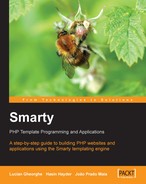There are three main ways to create filters and make them available on Smarty templates:
- Register a filter plug-in at run time and point Smarty to a PHP function callback from within the template script by using one of the
register_*filterfunctions. - Tell Smarty to automatically load a filter from the plugin directory with the
load_filterfunction. - Manually set the
autoload_filtersSmarty property to make it load the appropriate filters automatically for you.
Let’s go over these different ways now. To register a filter plug-in at run time, you need to use one of the following Smarty functions:
|
Type |
Method signature to register a plug-in |
|---|---|
|
Prefilters |
|
|
Postfilters |
|
|
Output filters |
|
Please note that the parameter called impl above refers to the function or method name that Smarty will call, and it can be one of the following:
- A string value holding the function name
- An array of the form
array($object, ‘method_name’) - An array of the form
array(‘class_name’, ‘method_name’)
When actually writing the PHP code for the filter plug-ins, follow these rules for the function arguments:
|
Type |
Function signature when writing the filter |
|---|---|
|
Prefilters |
|
|
Postfilters |
|
|
Output filters |
|
What this means is that for filter plug-ins, Smarty will pass the template source or template output as the first argument and the special Smarty object as the second argument to your PHP function, and expect you to return the modified source or output from that function.
